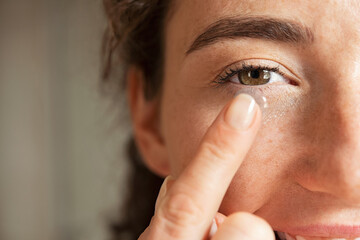
Contact lenses have revolutionized the way we correct our vision, offering comfort and convenience. However, wearing contact lenses comes with responsibilities, including proper hygiene, proper replacement of contact lenses, and adhering to recommended wear schedules. Failing to do so can lead to various complications, especially when it comes to sleeping with or overwearing contact lenses. In this blog post, we will explore the potential risks and complications associated with sleeping and overwearing contact lenses, highlighting the importance of following guidelines to protect your eye health.

Complications from Sleeping with Contact Lenses:
Corneal Infections: Sleeping with contact lenses significantly increases the risk of developing corneal infections, such as microbial keratitis. During sleep, the closed environment created by the lens provides a breeding ground for bacteria and other microorganisms. These can lead to severe infections that may cause redness, pain, sensitivity to light, and scarring which can lead to vision impairment.
Corneal Hypoxia: Contact lenses act as a barrier between the cornea and the oxygen supply from the atmosphere. When lenses are worn continuously, especially during sleep, the cornea may become deprived of oxygen, leading to corneal hypoxia. This condition can cause discomfort, dryness, blurred vision, corneal cysts, and even corneal swelling.
Giant Papillary Conjunctivitis (GPC): GPC is an inflammatory condition characterized by the formation of large bumps on the inner surface of the upper eyelids. It is commonly associated with the prolonged use of contact lenses, particularly when they are worn during sleep. GPC can cause itching, redness, discharge, and discomfort, leading to the need for temporary cessation of contact lens wear.
Complications from Overwearing Contact Lenses:
Corneal Neovascularization: Overwearing contact lenses can impede the normal oxygen supply to the cornea, leading to the growth of abnormal blood vessels, a condition known as corneal neovascularization. These blood vessels can compromise the clarity of the cornea, resulting in reduced vision and an increased risk of other complications.
Dry Eye Syndrome: Wearing contact lenses for extended periods can disrupt the tear film balance and contribute to the development of dry eye syndrome. Symptoms may include dryness, burning, itching, and a foreign body sensation. Prolonged dry eye can potentially damage the cornea and increase the risk of corneal infections.
Contact Lens-Related Eye Ulcers: Overwearing contact lenses, particularly beyond the recommended duration, can cause corneal ulcers. These are open sores on the surface of the eye that can lead to severe pain, redness, blurred vision, and potential vision loss. Prompt medical attention is necessary to prevent further complications.

Preventing Complications:
To protect your eye health and reduce the risk of complications associated with sleeping and overwearing contact lenses, follow these essential guidelines:
ALWAYS have a backup pair of glasses. If you do get an eye infection or something prevents you from wearing contacts while your eye heals, you will still be able to see by wearing glasses.
Adhere to recommended wear schedules and replace your contact lenses as instructed by your optometrist.
Remove your contact lenses before sleeping, even if they are labeled for extended wear.
Clean and disinfect your contact lenses properly using recommended solutions. NEVER USE TAP WATER.
Avoid wearing contact lenses for longer than the prescribed duration.
Take regular breaks from wearing contact lenses to allow your eyes to rest and breathe.
Prioritize good hygiene, including proper hand washing before handling your lenses.
While contact lenses offer freedom from glasses, it is crucial to recognize the potential risks associated with improper use, such as sleeping with or overwearing them. Contact lenses are a medical device, and should be treated as such. Complications ranging from corneal infections to dry eye syndrome can significantly impact your eye health and visual acuity. Remember, clear vision starts with clean habits. Prioritizing proper contact lens hygiene not only ensures comfortable and healthy eyes but also allows you to fully enjoy the freedom and clarity that contact lenses offer.






